Bugs play a crucial role in our ecosystem, yet there’s nothing more annoying than being swarmed by mosquitoes, gnats, flies, or no-see-ums. The itch and sting of their bites drive many to coat themselves in chemical bug sprays.
Did you know that DEET, a common ingredient in these sprays, is not only harmful to our nerves but has also been found in our groundwater?
But there’s a gentler, more eco-friendly way to keep those pesky insects at bay, and it’s right in your garden or even on your balcony! Plants, with their natural bug-repelling powers, offer a wonderful alternative to chemical repellents.
Imagine sitting on your patio, surrounded by pots of fragrant herbs and flowers that keep the bugs away. It’s not only possible; it’s quite easy to achieve.
Let me share a little story. Last summer, I decided to test this out myself. I planted lavender and citronella around my patio. Not only did my outdoor space smell amazing, but I also noticed a significant drop in the number of mosquitoes buzzing around. It was a game-changer.
So, whether you’ve got a green thumb or just a balcony to decorate, incorporating some of these plants could make your summer nights much more enjoyable, minus the itchy bites.
In this article, we’re diving into the world of plants that repel bugs and greenify your lives.
Can Garden Plants Repel Bugs?
It might sound like an old wives’ tale, but the ability of certain garden plants to repel insects is backed by solid science. While the idea of a bug-free garden thanks to the plants you choose might seem too good to be true, researchers have been studying the effectiveness of various botanicals as natural insect repellents for years.
The results? Quite promising.
According to a 2020 study, certain plant extracts, like marigolds, could repel bugs effectively. In another study on Malaria, citronella or neem, has been proven to keep mosquitoes at bay for up to two hours when applied to the skin.
Another 2023 Polish study highlighted that essential oils from lavender and peppermint not only repel certain bugs but can kill them on contact.
But how do these plants work their magic? It’s all in the compounds they produce. These natural oils and scents are not just pleasing to our noses; they act as a deterrent to insects. For instance, lemongrass contains citronella, while marigolds produce pyrethrum, an ingredient used in many insect repellents. You’re leveraging nature’s defense mechanisms by integrating these plants into your garden or patio.
Statistics show the effectiveness of these natural solutions. In controlled studies, areas surrounded by repellent plants like citronella and lavender saw mosquito populations decrease by as much as 75%. Furthermore, gardens containing a diverse mix of these plants reported fewer incidences of pest-related plant damage.
So, can garden plants repel bugs? Absolutely. The science and statistics are clear. With a thoughtful selection of fragrant herbs and flowers, your garden can become a peaceful haven for you and a no-fly zone for pests.
1. Lemongrass/Citronella Grass
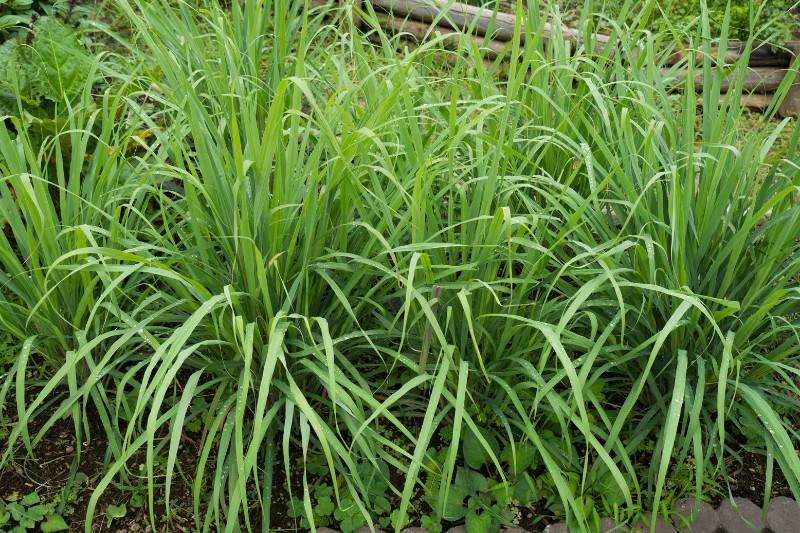
Citronella, a name you’ve probably heard linked to mosquito-repelling candles, comes from a natural oil found in lemongrass. This plant isn’t just for show; it can shoot up to four feet tall and spread out three feet in a single growing season, making it an impressive addition to any garden.
Did you know that lemongrass has been proven to keep 100% of Anopheles culicifacies mosquitoes at bay? This particular mosquito is known for spreading malaria, but lemongrass stands as a formidable barrier against them and other mosquito species as well.
Here’s a fascinating piece of research I came across from the Malaria Journal in 2019. The study dives deep into how effective plant-based repellents like lemongrass are against various Anopheles mosquitoes. It’s quite an eye-opener to see science backing up the use of natural solutions in our fight against these pests.
But lemongrass isn’t a one-trick pony; it’s part of the larger Cymbopogon family, which also includes the culinary favorite, citronella grass. If you’re thinking of growing it, remember that it thrives in places with full sun and loves moist, loamy, but well-draining soil. However, it’s a bit of a diva when it comes to climate. Citronella grass is a perennial only in the warmest parts of the U.S., like South Florida. In cooler areas, it’s grown as an annual.
I have a little story about growing lemongrass in a pot on my balcony. Despite not living in the warmest of climates, the potting method allowed me to enjoy its fresh, citrus scent and even use some in my cooking. It was also comforting to know it was keeping mosquitoes away every time I stepped outside.
2. Marigolds
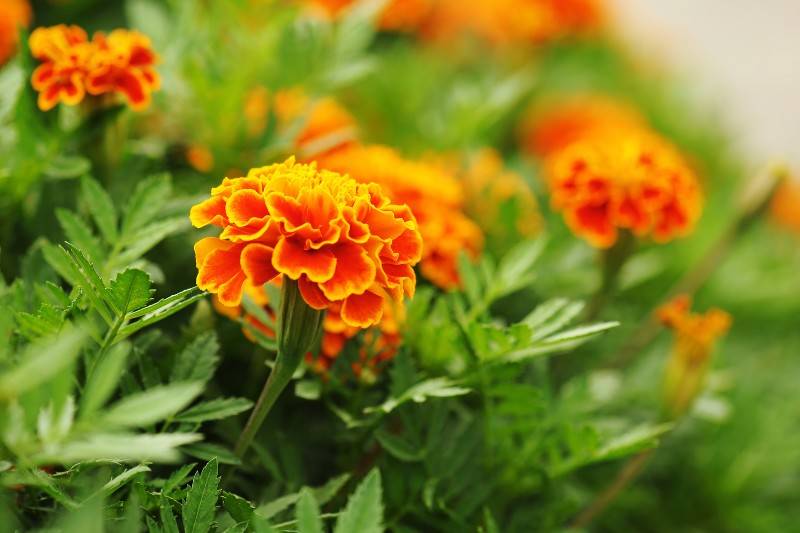
Marigolds aren’t just pretty flowers; they’re powerful bug-fighting heroes for your garden! These vibrant plants pack a punch with their strong scent, keeping pests like flies, aphids, mosquitoes, and even wasps at bay. Gardeners love them not only for their beauty but for their natural ability to repel unwanted insects.
Brock Ingham, a gardening expert and the editor of Bigger Garden, shares some insights into why marigolds are such effective pest deterrents. The secret lies in a compound called thiophene, found in both French marigolds (Tagetes patula) and African marigolds (Tagetes erecta). This essential oil is a natural insect repellent, sending bugs packing with its potent aroma.
According to Ingham, “The strong smell of French marigolds is especially good at keeping aphids, whiteflies, mosquitoes, and even nematodes away. While African marigolds also work wonders, their scent might be a bit milder.”
But there’s more to these garden warriors than meets the nose. Some marigolds have another trick—producing chemicals in their roots that fight off root-knot nematodes, a common garden pest. This means planting marigolds can protect your garden below the surface too. However, to make the most of this benefit, you’ll need to plan ahead. Marigolds should be in the ground a few months or even a year before other plants to effectively ward off nematodes.
Remember, not all marigolds are created equal when it comes to fighting nematodes. Doing a bit of research to find the right type, particularly French marigolds, can make all the difference in protecting your garden.
3. Lavender
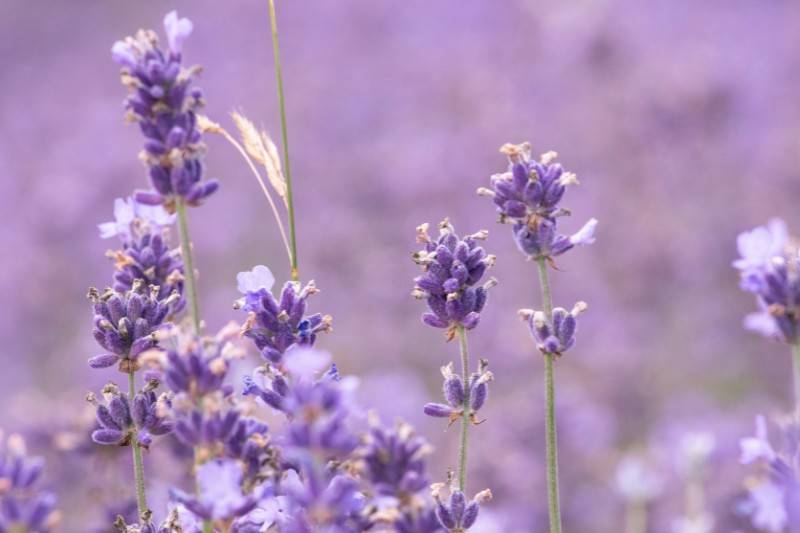
Lavender, known for its beautiful flowers and soothing fragrance, is also a superhero when it comes to keeping mosquitoes at bay. Its secret weapon? A compound called linalool, which makes up to 25% of lavender’s essential oil. This compound is a delight to our noses, widely used in products like fresheners and cosmetics for its pleasant aroma.
Interestingly, what’s pleasant for us is a nightmare for mosquitoes. Linalool’s strong scent overwhelms their sensitive smell receptors, working much like DEET but without the chemicals. Studies have shown that lavender oil can fend off mosquitoes with an impressive 93% effectiveness indoors and about 53% outdoors.
When compared to other essential oils, lavender stands out as one of the top natural repellents. It’s even more powerful when mixed with other bug-repelling oils like cinnamon, tea tree, or citronella, creating a pleasant-smelling shield against pesky mosquitoes.
Got some lavender in your garden?
Simply crush the flowers and rub them on your skin, focusing on areas often targeted by bites, like your ankles and arms.
For a DIY mosquito repellent, mix lavender essential oil with witch hazel in a spray bottle (one part oil to ten parts witch hazel). Give it a shake and spritz it on your skin and clothes for a natural protective layer.
Alternatively, for a quick and easy solution, start with lavender floral water as a base and add 25 to 35 drops of lavender essential oil. Feel free to mix in citronella or lemon eucalyptus oil, but keep the total oil drops to 35 per 100ml bottle. This blend makes for a fantastic natural bug spray.
4. Mint
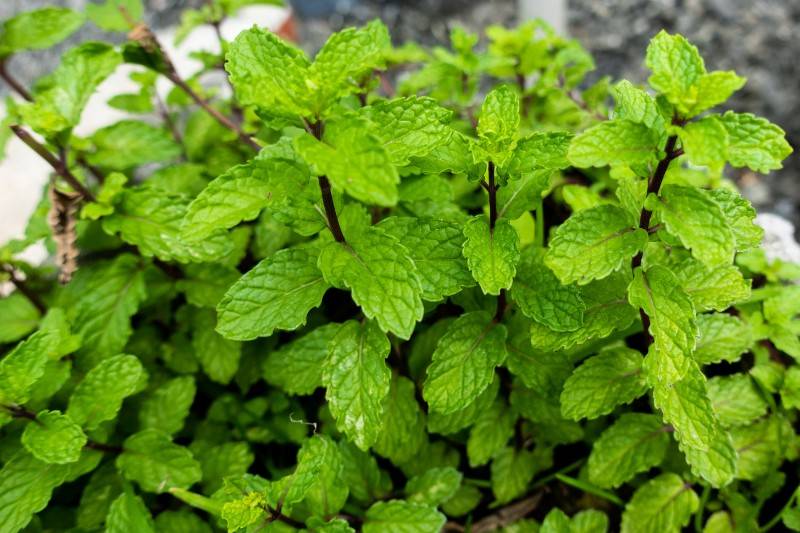
Mint isn’t just for freshening up your breath or adding a zing to your meals; it’s also a natural mosquito bouncer! Its strong aroma, which we find refreshing, is a turn-off for mosquitoes.
This scent isn’t limited to the leaves; it runs through the stems and flowers too. Imagine making your own mosquito repellent: a bit of mint oil, some apple cider vinegar, and a splash of vodka (or witch hazel) mixed together.
Plus, popping a few pots of mint around your garden or patio can help keep your green space bug-free.
Here’s a little tip: it’s wise to grow mint in pots rather than directly in your garden. Why? Because mint loves to spread out and take over. Once it settles in, it’s like that guest who won’t leave the party.
For those wondering about the best conditions for mint: it loves basking in full sun, and prefers its soil moist, rich, and just a tad acidic. So, if you’re looking to keep mosquitoes at bay in a natural, fragrant way, mint might just be your new best friend.
5. Rosemary
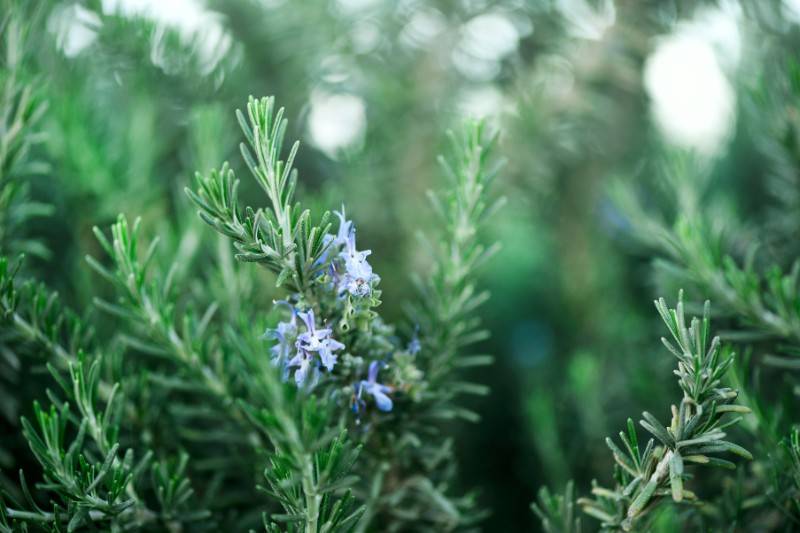
Rosemary isn’t just a favorite herb for cooking; it’s also a bug’s worst nightmare. The very oils that make it a hit in the kitchen are what bugs can’t stand. Both the plant and its clippings work wonders in keeping pests away.
Imagine making your own bug repellent at home: just boil some dried rosemary in water, strain it, and mix it with cool water. Keep this natural spray in the fridge, and use it until it loses its rosemary scent.
Another cool trick? Throw rosemary sprigs on your BBQ to keep mosquitoes from crashing your outdoor feast.
You can enjoy rosemary in many ways – grow it in pots to decorate your patio, shape it into beautiful green pyramids, or let it flourish in your herb garden. Some types even grow big enough to become a stunning part of your landscape.
For those looking to add rosemary to their garden, remember it loves soaking up the sun. It thrives best in loamy, slightly acidic, well-draining soil. So, not only can rosemary add a flavorful twist to your meals, but it can also keep your outdoor gatherings pleasantly bug-free.
6. Allium
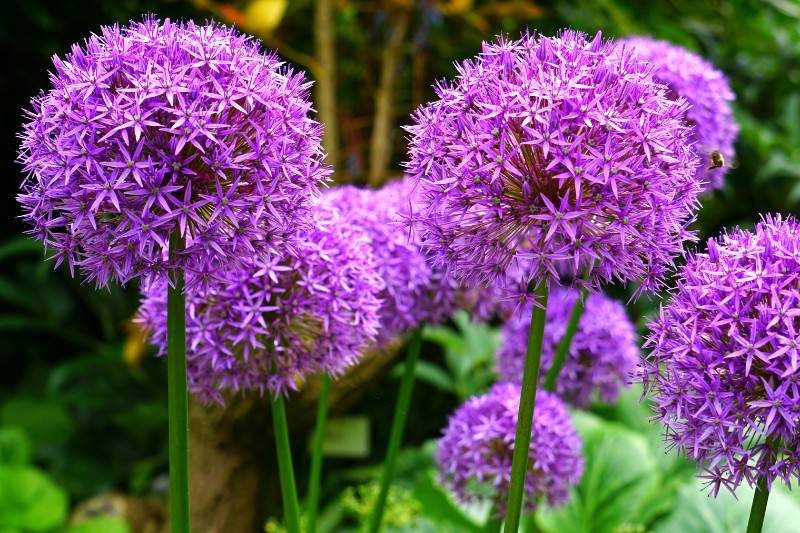
Allium plants, like the towering Allium giganteum, are not just show-stoppers with their stalks that can reach up to six feet tall. They’re also ancient natural insect fighters.
These plants are known to keep away common garden pests such as aphids, slugs, cabbage worms, and carrot flies. Imagine planting them alongside your veggies like tomatoes, peppers, potatoes, cabbage, broccoli, and carrots for an extra layer of protection.
Plus, smaller alliums like chives, garlic chives, leeks, and shallots not only spice up your dishes but also help keep your roses aphid-free.
If you’re thinking of adding alliums to your garden, they love basking in full sunlight. They thrive in rich, well-draining soil with a neutral pH. So, not only do alliums add a dramatic flair to your garden with their impressive height and vibrant blooms, but they also guard your veggies and beautify your plates. It’s a win-win for gardeners and cooks alike!
7. Catnip

Catnip, a member of the mint family, is not just a treat for cats but also a natural guard against pests like mosquitoes, flies, deer ticks, and cockroaches. This is thanks to a compound called nepetalactone, which, interestingly, seems to give bugs the feeling of pain or itching.
According to a study in Current Biology by Nadia Melo in 2021, this compound can outperform DEET in repelling mosquitoes, though it’s less effective when used directly on the skin.
Growing catnip is quite straightforward. Whether you start with seeds or young plants, spring or fall is the perfect time to get them in the ground. Watch as they shoot up to three or four feet tall, sporting charming little lavender blooms. A word of caution: catnip loves to spread, so keep an eye on it unless you want a garden takeover.
For the best growth, place your catnip in a spot where it’ll enjoy plenty of sunlight. It prefers fertile, well-draining soil to thrive. So, if you’re looking for a plant that pleases both your feline friends and helps keep pesky insects at bay, catnip might just be the perfect addition to your garden.
8. Basil

Basil isn’t just a key ingredient for your pesto; it’s also a superhero in the garden, fighting off pesky invaders like flea beetles and the tricky cabbage webworm.
What’s more, it packs a punch with four bug-repelling compounds: estragole, citronellal, limonene, and nerolidol. The best part? It starts working its magic without even needing a bruise.
And here’s a cool tip: you can whip up your own bug spray with fresh basil. Just pour boiling water over a bunch of basil leaves (stems are fine too) and let it sit for a few hours. After straining, squeeze the leaves to get every last drop of basil goodness into the mix. Add in some vodka for an extra kick, store it in the fridge, and you’ve got yourself a homemade repellent spray. Just remember to spray it away from your face.
For those looking to add basil to their green collection, it loves soaking up the sun. Plant it in moist, nutrient-rich soil that drains well, and you’ll have a happy plant that keeps you and your garden pest-free.
9. Chrysanthemums
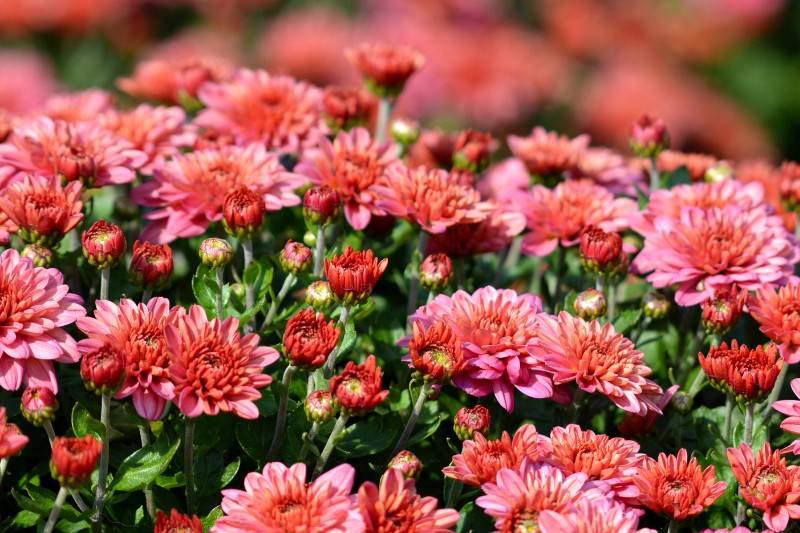
Chrysanthemums aren’t just beautiful flowers to adorn your garden; they’re also nature’s own pest control. These colorful blooms are a nightmare for a whole list of unwelcome guests like roaches, ants, ticks, and even bedbugs, thanks to a powerful ingredient called pyrethrum. This natural compound is so effective it’s used to create many of the bug sprays and pet shampoos we use at home.
But here’s something to think about: while the man-made versions of pyrethrum, known as pyrethroids, are widespread in insecticides, they’re not great for our environment. Studies, like one from Équiterre in 2016, have shown they can harm aquatic life, birds, and beneficial insects.
The good news? By planting chrysanthemums around your home or along your garden borders, you can tap into their bug-fighting powers naturally, without the side effects on the environment.
Plus, they need simple care – just a sunny spot and sandy or loamy soil that drains well. So, you can keep pests at bay and have a gorgeous garden full of chrysanthemums.
10. Ageratum/Floss Flower
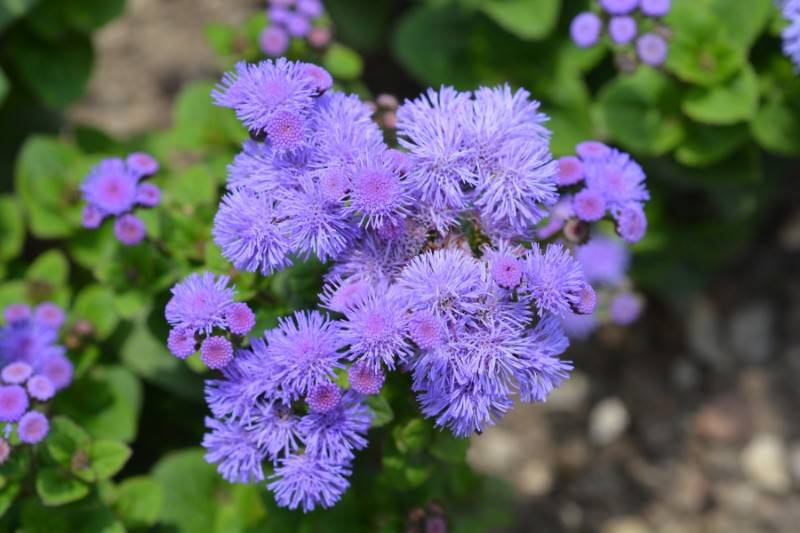
Ageratum, or floss flower, is a small but mighty addition to any garden. Its secret weapon against insects is coumarin, a chemical that bugs, especially mosquitoes, find unbearable. The good news is, while mosquitoes steer clear, pollinators like butterflies and bees aren’t bothered, and hummingbirds are big fans of these vibrant flowers.
A word of caution for pet owners: ageratum plants are not safe for cats and dogs, so it might be best to consider other options if you have furry friends around. To maximize their bug-repelling abilities, you can crush the leaves, which releases more of that mosquito-disliking scent. However, it’s important to remember not to apply the crushed leaves directly to your skin.
These plants are pretty adaptable, happy in both full sun and partial shade, and they thrive in rich, well-draining soil that’s packed with organic matter. Adding ageratum to your garden not only brightens it with their charming blooms but also creates a more enjoyable, bug-free outdoor space.
Garden Guardians: Our Plant Heroes
And that’s a wrap, garden detectives! We’ve journeyed through the magical world of plants, discovering not just their beauty but their superpowers too. From the towering lavender that wards off pesky mosquitoes with its sweet scent, to the mighty marigolds that protect our veggies from sneaky bugs, each plant has its own special way of keeping our gardens happy and healthy.
Remember, adding these plant heroes to our gardens doesn’t just make our outdoor spaces look pretty; they also work hard to keep those annoying bugs at bay. Whether it’s the mint that keeps mosquitoes away or the cheerful chrysanthemums fighting off a whole army of insects, each plant plays a part in our garden’s defense system.
So, the next time you’re in your garden, take a moment to thank these guardians of the green for their hard work.
And who knows? Maybe you’ll be inspired to add a few more plant heroes to your outdoor space.

